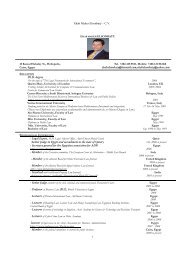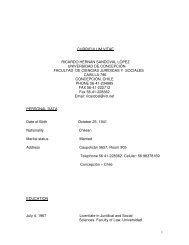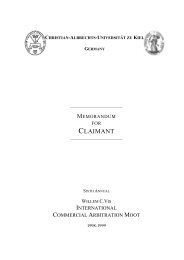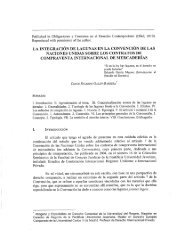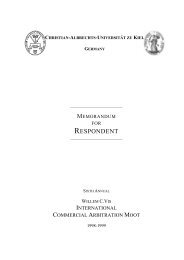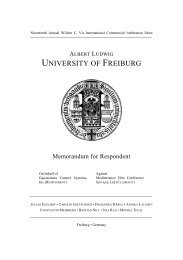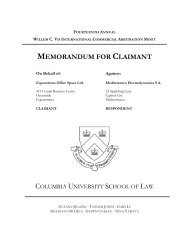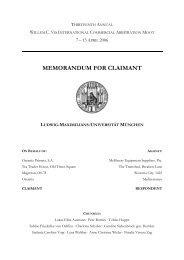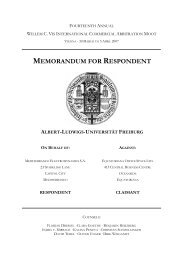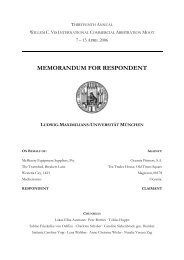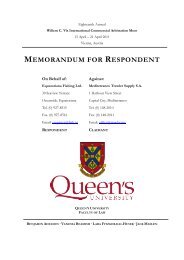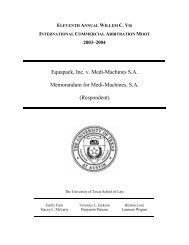Claimant's brief (Cologne) - Pace University
Claimant's brief (Cologne) - Pace University
Claimant's brief (Cologne) - Pace University
Create successful ePaper yourself
Turn your PDF publications into a flip-book with our unique Google optimized e-Paper software.
UNIVERSITY OF COLOGNE Page 10<br />
used for serving this contract. Additionally, CLAIMANT mentioned the versatility of the<br />
machines as an important feature directly in context with the packaging to be done for A2Z.<br />
32 Under Art. 45 (1) CISG, an obligation is imposed on the seller to warn or to inform the buyer<br />
about restrictions of the sold goods (SCHLECHTRIEM, Art. 45 at 3; STAUDINGER-MAGNUS, Art.<br />
45 at 33; ACHILLES, Art. 45 at 2). It is a general principle of international sales law that the<br />
parties are obliged to provide each other with information necessary to avoid any threat to the<br />
purpose of the contract (SCHLECHTRIEM-FERRARI, Kommentar, Art. 7 at 54; AUDIT, p. 51,<br />
HONNOLD at 100).<br />
33 RESPONDENT was informed that the machines, although not designed for packaging salt,<br />
were intended to be used with salt and knew that this would cause severe damage. Therefore,<br />
RESPONDENT was obliged to warn CLAIMANT not to use the machines with salt. As it<br />
failed to do so, it breached an obligation arising out of the contract according to Art. 45 (1)<br />
CISG.<br />
II. RESPONDENT may not argue that CLAIMANT’s intention to use the machines<br />
with salt was communicated too late to affect its responsibility<br />
34 RESPONDENT may not argue that CLAIMANT’s intention to use the machines with salt<br />
was communicated too late, because the contract had already been concluded and the specific<br />
machines had been selected and packed for shipment (Statement of Defense at 9). An<br />
obligation to warn the buyer about any restrictions of the sold goods does not cease when the<br />
contract is concluded, as the parties remain obliged not to imperil the purpose of the contract<br />
(STAUDINGER-MAGNUS, Art. 7 at 47; SCHLECHTRIEM/FERRARI, Kommentar, Art. 7 at 54). The<br />
machines were not yet installed at CLAIMANT’s place of business and were not in use at the<br />
time of the telephone conversation. Thus, the warning would have prevented damage to the<br />
machines and RESPONDENT was still subject to the obligation to warn CLAIMANT.<br />
III. CLAIMANT could not be expected to know not to use the machines with salt<br />
35 RESPONDENT may not assert that CLAIMANT was advised not to use the machines with<br />
salt. In the telephone conversation on 23 July 2002, CLAIMANT informed RESPONDENT<br />
about the prospective use of the machines with salt (Claimant’s Exhibit No. 5, para. 5;<br />
Statement of Defense at 6). RESPONDENT remained silent (see supra 30) and therefore<br />
CLAIMANT legitimately relied on the suitability of the machines for packaging salt.<br />
36 RESPONDENT may not argue that CLAIMANT’s reliance was no longer legitimate after it<br />
had received the operations manual. The operations manual solely contained the general



